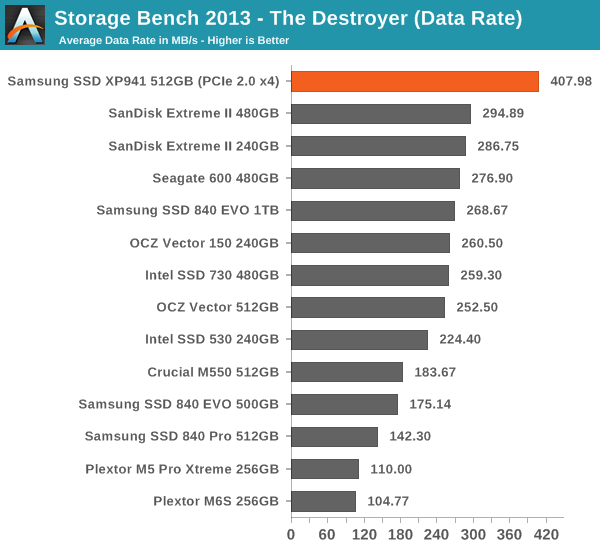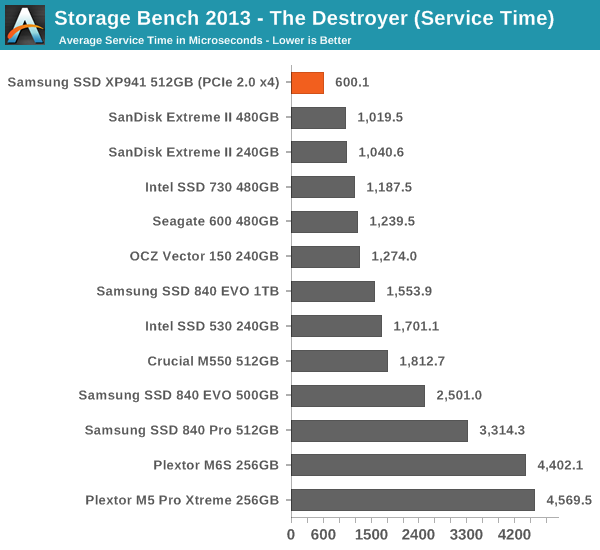Samsung SSD XP941 Review: The PCIe Era Is Here
by Kristian Vättö on May 15, 2014 12:00 PM ESTAnandTech Storage Bench 2013
Our Storage Bench 2013 focuses on worst-case multitasking and IO consistency. Similar to our earlier Storage Benches, the test is still application trace based—we record all IO requests made to a test system and play them back on the drive we're testing and run statistical analysis on the drive's responses. There are 49.8 million IO operations in total with 1583.0GB of reads and 875.6GB of writes. I'm not including the full description of the test for better readability, so make sure to read our Storage Bench 2013 introduction for the full details.
| AnandTech Storage Bench 2013 - The Destroyer | ||
| Workload | Description | Applications Used |
| Photo Sync/Editing | Import images, edit, export | Adobe Photoshop CS6, Adobe Lightroom 4, Dropbox |
| Gaming | Download/install games, play games | Steam, Deus Ex, Skyrim, Starcraft 2, BioShock Infinite |
| Virtualization | Run/manage VM, use general apps inside VM | VirtualBox |
| General Productivity | Browse the web, manage local email, copy files, encrypt/decrypt files, backup system, download content, virus/malware scan | Chrome, IE10, Outlook, Windows 8, AxCrypt, uTorrent, AdAware |
| Video Playback | Copy and watch movies | Windows 8 |
| Application Development | Compile projects, check out code, download code samples | Visual Studio 2012 |
We are reporting two primary metrics with the Destroyer: average data rate in MB/s and average service time in microseconds. The former gives you an idea of the throughput of the drive during the time that it was running the test workload. This can be a very good indication of overall performance. What average data rate doesn't do a good job of is taking into account response time of very bursty (read: high queue depth) IO. By reporting average service time we heavily weigh latency for queued IOs. You'll note that this is a metric we've been reporting in our enterprise benchmarks for a while now. With the client tests maturing, the time was right for a little convergence.

In our most demanding storage test, the XP941 is just amazing. It's about 40% faster than any SATA 6Gbps drive we have tested, which is huge. Obviously it's not the random performance that makes the XP941 shine but the large IO sequential performance where the PCIe interface can be used to its full extent. While most IOs in client workloads tend to be random, the sequential performance can certainly make a big difference and high queue depth random reads can also take advantage of the faster interface.











110 Comments
View All Comments
BMNify - Friday, May 16, 2014 - link
rod, if you go ,as well as Everspin, look out for Crocus Technology Russian MRAM HW makers ARM licenced their IP , and Avalanche Technology tooRamCity - Monday, May 19, 2014 - link
Yes, I will be going to Computech. I'll add those vendors to my visit list and check out what they are up to if they have a booth.RamCity - Monday, May 19, 2014 - link
I mean Computex!Jay77 - Thursday, May 15, 2014 - link
I suppose I should read more than the first and last pages if I'm going to make comments.Babar Javied - Thursday, May 15, 2014 - link
There is a mistake/typo in "Performance Consistency & Trim Validation" under the "Trim Validation" section. Below the first graph in the said section, you have wrote "doesn't treat PCIe drives the same even if the utilize the same AHCI" when you ment to say "even if THEY utilize the same AHCI"Ryan Smith - Thursday, May 15, 2014 - link
Fixed. Thank you for pointing that out.BMNify - Thursday, May 15, 2014 - link
so basically you gimped the one and only raid 0 test by not doing it in windows or even better simply boot any linux iso/usb stick and formatted the ssd-xp941 WITH the samsung "F2FS" file system for maximum speed as that is written especially for ssdKristian Vättö - Saturday, May 17, 2014 - link
I did RAID the XP941s in Windows as well but the results were similar so I figured that there is no need to report the results separately.rocky12345 - Thursday, May 15, 2014 - link
I like that there are extra speed speed in these new devices but it seems everyone is so stuck on more speed more speed..lol I am sorry but when a standard SSD can boot a windows 7 in about 6 seconds when are people going to be happy. My Asus laptop has a SSD in it & boots in about 6 to 7 seconds & things like firefox open even before my finger un-clicks the mouse button to open firefox. now everyone is saying standard SSD is to slow..lol to funny. What I would rather like to see is bigger SSD drives at a better price. We already have good speed but the big drives still cost to much for most people when they can make a 1TB SSD at about the same or just slightly more than a standard hard drive then maybe they should be more worried about all these new extreme speed drives but if they make standard SSD drives go the way of the doo doo bird then we are never going to see low priced SSD anything because they will always be treating anything SSD related as new tech just a thought.BMNify - Thursday, May 15, 2014 - link
"but it seems everyone is so stuck on more speed more speed..lol I am sorry but when a standard SSD can boot a windows 7 in about 6 seconds when are people going to be happy..."well obviously speed is not for you, but how do you expect current non volatile ram to lower in price if they don't bring out newer kit to replace it at today's higher price points !
im not sure you understand the driving forces here as regards people wish for faster data access, we really need/WANT a so called "universal non volatile ram [such as those Everspin ST-MRAM DDR3 DIMMs referenced ]" sooner than later at equivalent ddr3 2400,wideIO2,HMC speeds and configurations so we can start to take better advantage of the higher data throughput and data manipulation these bring to the table, its not good enough to x264 encode UHD content in real time right now, then and only then will we start to consider we are starting to get close to enough general speeds, ALIMO.... YMCV